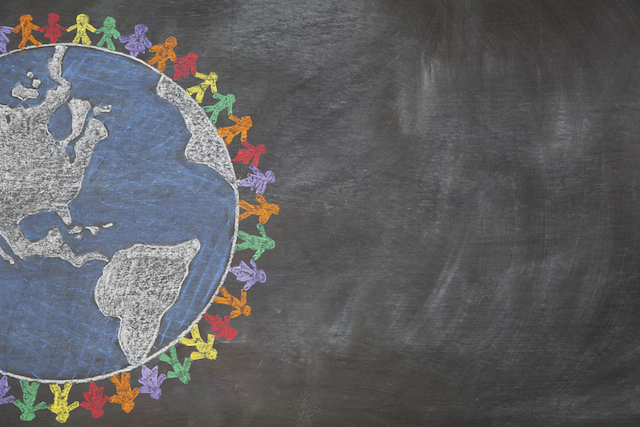
“It is every man’s obligation to put back into the world at least the equivalent of what he takes out of it.” ~Albert Einstein
My son recently returned home from college with a new demeanor.
He was helpful, considerate, interested in others, and genuinely happy. The change was a far cry from the boy who had left for college just a few short months before.
Don’t get me wrong, he has always been a good kid, but up until now he’s been a typical teenager. He was a bit messy, a bit lazy, and if it wasn’t part of his video game he was mostly uninterested.
So what changed?
My husband and I began discussing it over dinner. I told him I thought it had a lot to do with the philanthropic efforts of the fraternity he joined. Now instead of playing video games all weekend, he was volunteering at animal shelters and helping the less fortunate by providing physical labor.
My husband was intrigued. He had always associated philanthropy with money. After all, it’s a word often associated with wealth or large foundations; was it possible for an average person to be philanthropic?
We began doing research on philanthropy and found that anyone can be philanthropic.
The word philanthropy actually means “love of humanity.” To be philanthropic means to care, nourish, develop and enhance the human experience.
Philanthropy is different than charity. The easiest way to explain the difference is that charity takes care of an immediate need, where philanthropy tries to solve a problem.
Think of it as you can give someone money so that they may buy a meal (charity), or you can teach the person a skill so that they may make a wage and pay for their own meal (philanthropy).
Research suggests one of the keys to happiness is the act of helping others. It is known as the “helper’s high.” This would explain the change in my son’s personality.
Medical research into the “helper’s high” phenomenon has shown people who volunteer experience feelings of euphoria. They also found this “high” has possible health benefits that far outreach the act of giving.
Research suggests people who regularly participate in charities have less pain, sleep better, and have a personal sense of reward and fulfillment.Giving leads to a happier life.
Philanthropy goes beyond the basics of giving time or money to a cause. It is a foundation that when regularly practiced builds relationships and strengthens self-worth. It is a circular action that builds momentum. We give because it makes us feel good. We feel good because we give.
Like anything worthwhile in life, there has to be balance. Sometimes too much of a good thing can cause harm. In order to maximize the benefits of philanthropy it’s important to understand how to be a healthy giver.
Here are five things you should know in order to maximize the benefits of happiness from philanthropy.
1. Understand philanthropy is selfish.
Some people find fault in giving to receive, but how else can you give? It’s like eating without satisfying hunger. Yes. We receive and emotional high when we give, but the happiness experienced from giving is natural.
Some research suggests that you cannot fulfill happiness without giving. Philanthropy is a route to give happiness away in exchange for our own new recharged happiness.
2. You cannot save the world.
Some get discouraged because they think too big and their efforts become unrealistic. This can actually have the adverse effect and brings unhappiness. You cannot change the world by yourself, but your efforts, in conjunction with others, can change a life.
Concentrate on the smaller benefits of giving to maximize the cycle of happiness.
3. Don’t give to the greatest need unless your heart is in it.
Only choose causes that speak to your heart. If you love animals, volunteer in a shelter or become a foster home for a kill shelter. If you love children, become a mentor to a high-risk child. The closer your heart is to the cause, the more benefit for your natural cycle of happiness.
4. Make giving a regular part of your routine.
Not being consistent in giving your time or money will not increase your happiness. It’s like diet and exercise. If you don’t practice the change consistently, you cannot maximize the benefits.
Benefits come when relationships form and strengthen over a time of regular giving. This is the best way to see your efforts at work and receive the valuable feedback regarding the difference your efforts make.
5. Never give too much of yourself to help others.
Balance is a key in giving just like in all things in life. Never sacrifice your own needs for the needs of others. It’s just like the flight attendant tells you before the plane takes off. Secure your own oxygen before assisting others.
After seeing the difference giving has made in my son’s life, I’m ready to begin incorporating regular giving into my own life. I hope you join me.
Do you have a cause that’s close to your heart where you give regularly? How has it made a difference in your life?
People holding hands image via Shutterstock
About Missy Yost
Missy Yost is a freelance writer, blogger, and life mentor dedicated to helping people find their individual path towards happiness through concepts of positive psychology. Her blog can be found www.fulfillhappiness.com.













 Though I run this site, it is not mine. It's ours. It's not about me. It's about us. Your stories and your wisdom are just as meaningful as mine.
Though I run this site, it is not mine. It's ours. It's not about me. It's about us. Your stories and your wisdom are just as meaningful as mine. 